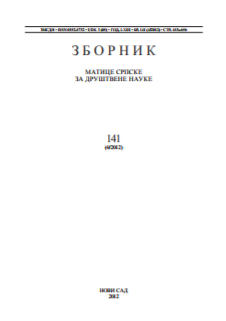ПРОМЕНА ПАРАДИГМЕ У НЕМАЧКОЈ ИСТОРИЈСКОЈ НАУЦИ: У ХРВАТСКОЈ ДРЖАВИ 1941–1945. НИЈЕ ИЗВРШЕН ГЕНОЦИД НАД СРБИМА?
A PARADIGM SHIFT IN GERMAN HISTORIOGRAPHY: IN THE STATE OF
CROATIA (1941–1945) THERE WAS NO GENOCIDE AGAINST THE SERBS?
Author(s): Vladimir UmeljićSubject(s): Christian Theology and Religion, Recent History (1900 till today), Studies in violence and power, WW II and following years (1940 - 1949)
Published by: Матица српска
Keywords: Independent State of Croatia (1941–1945); genocide; the Roman Catholic Church; German historiography;
Summary/Abstract: At the Humboldt University of Berlin, German historian Alexander Korb defended, with the highest grade (summa cum laude), his doctoral thesis in historical studies „In the Shadow of the World War II. Mass violence by the Ustaša against Serbs, Jews and Roma“. His radically new thesis are as follows: 1) in the State of Croatia (1941–1945) „there was no genocide against the Serbs“; 2) clerical component (Croatian Catholic clergy and the Vatican) „played no significant role“ in the mass violence against the Serbs in the State of Croatia (1941–1945), so the forced catholicization of the Serbs was „purely secular in character“. Korb, therefore, enters into absolute conflict with the vast majority of previous research papers and their conclusions. Korb’s theses are challenged from three aspects in this analysis: a) scientific and historical, b) linguistic and philosophical (definitionism theory) and c) political. Regarding scientific and historical aspects, Korb approached this problem onesidedly, in a selective way, and from the very beginning drastically reduced i.e. excluded an enormous part of primary historical sources and scientific literature. He excluded all Serbian sources, including testimonies of Serbian survivors and victims, on the grounds that they were either „Serbian nationalists“ or „Serbian communists“, then all testimonies of eye-witnesses from the the opressors side – German Nazis and Italian Fascists – with justification that they are manipulated by „Serbian nationalists“ or „Serbian communists“, as well as all primary historical sources and scientific literature which testify of the role of Croatian Roman Catholic clergy and the Vatican, on the basis that they are „anti-clerical“. From linguistic and philosophical aspect, Korb‘s argumentations clearly belong to the principle of „usurpation of power over definitions and psychagogy“ recognized by classical theory of concepts as a convenient redefinition, virtualization of reality and psychagogic establishment of the new „real reality“ in the minds of the target group through its internalization. Korb‘s work is, therefore, rather relativistic linguistic and philosophical treatise clad in historical science than scientific study of history. As for the aspect of political science, it can be concluded that paradigm shift in social sciences and humanities in Germany, due to his indisputable efforts, obtained a new quality, a completely different level of arbitrary and virtual reflection of reality. Namely, these sciences are rapidly getting common and dominant ideological and political connotation.
Journal: Зборник Матице српске за друштвене науке
- Issue Year: 2012
- Issue No: 141
- Page Range: 523-550
- Page Count: 28
- Language: Serbian

